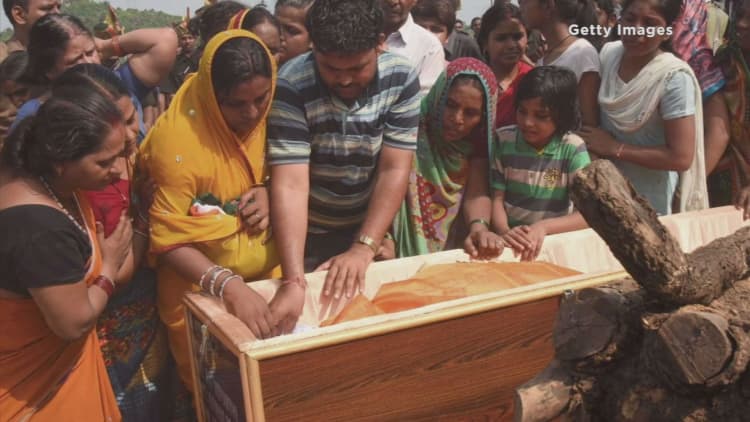
Tensions between New Delhi and Islamabad are hitting a boiling point as the two point fingers at each other over Sunday's assault in Kashmir. But even as rhetoric gets heated, military escalation isn't expected—for now.
Four gunmen stormed an Indian army brigade headquarters in the Indian-administered town of Uri, killing 18 soldiers on Sunday. Many called it the deadliest attack on security forces in nearly a decade. Nobody has claimed responsibility but Prime Minister Narendra Modi's government accused Pakistan of involvement, labeling it a terrorist state for supporting militants believed to be the perpetrators of Sunday's attack.
India claims the gunman were members of Jaish-e-Mohammed (JeM), a terror group based in Pakistan and known for brutal tactics in India-controlled Kashmir to force the withdrawal of troops.
Islamabad has categorically rejected the allegations, describing the charges as New Delhi's attempt to deflect attention from the deteriorating human rights situation in Indian-controlled Kashmir.
The bickering between the two arch-enemies is currently playing out at the on-going United Nations General Assembly (UNGA) session in New York, where Pakistan Prime Minister Nawaz Sharif is expected to raise the issue during his address on Wednesday.
What’s next?
On Tuesday, Indian forces killed at least 8 suspected militants along the 800 kilometre border with Pakistan, Reuters said. Known as the Line of Control (LOC), the partition separates areas under Indian administration, primarily Jammu and Kashmir (J&K), from Pakistan's territories, which include Gilgit-Baltistan and Azad Kashmir.
More skirmishes are widely expected. But Modi's government possesses little elbow room for full-blown military action given the risk of a long drawn-out conflict between the nuclear neighbors, according to strategists.
The severity of Sunday's attack has raised public anger in India, with protesters burning the Pakistani flag and calling for revenge. In a Pew Research Center survey of 2,464 Indians released on Monday, half disapproved of Modi's relationship with Pakistan while three-fifths supported the use of force against the war on terror.
"Domestic pressure is clearly growing on Modi to retaliate quickly, but that's easier said than done...The government is unlikely to risk a serious miscalculation," observed Jan Zalewski, senior India analyst at global risk consultancy Verisk Maplecroft.
"Delhi doesn't appear to have a clear game-plan on how to calm the situation, and so it will want to desist from any knee-jerk reactions to the attack that could make things even worse."
In recent years, India has refrained from aggressive responses to terrorism, which included the 2008 Mumbai attacks carried out by Pakistani militants that left 166 dead. Instead, New Delhi has used international gatherings to highlight what it calls Pakistani support of terrorists.
For now, it appears the government will continue this approach. The Indian Express reported on Monday that military commanders warned Modi against calls for immediate surgical strikes inside Pakistan.
Retaliation would be a setback to Modi's attempts at normalizing relations with Pakistan, cautioned Dhruva Jaishankar, foreign policy fellow at Brookings Institution India. If Modi chooses to stay calm, he has the ability to withstand public pressure, Jaishankar added.
Domestic politics is another reason why New Delhi may wish to abstain from an armed conflict.
"Continued unrest in Kashmir could also bring down the state government, an uneasy coalition between a local party and the nationally ruling Bharatiya Janata Party (BJP), setting back the party's efforts to reach out to India's minority Muslim community ahead of upcoming state elections," Eurasia warned in a recent note.
The BJP's opposition could also exploit the current crisis to disrupt the winter session of parliament, which opens in November, and potentially delay legislation necessary to implement the long-awaited goods and services tax, Eurasia added.
For Kashmiris however, Sunday's attack is yet another obstacle towards peace.
"Who has benefited from this? Surely not Kashmiris," remarked Farooq Siddiqi, head of the World Kashmir Diaspora Alliance, a Canadian-based non-profit with chapters in Brussels and the U.S.
Inside the crisis
Sunday's attack was the latest act of aggression in the decades-old conflict that has seen Kashmir's mountainous landscape used as a battleground for India-Pakistan tensions. The two nations have fought four wars, three of which were over the Himalayan region.
Violations are cited on both sides of the border, underscoring the human cost of the conflict. Indian law-enforcement officials are guilty of extrajudicial killings, torture, rape and enforced disappearances in J&K while Pakistan represses democratic freedoms, silences the press and practices routine torture in Azad Kashmir, Human Rights Watch (HRW) said.
Longstanding pressures between armed political factions in J&K, civilians and Indian troops have flared in recent months, reviving calls for self-rule as anger grows over New Delhi's actions.
"Kashmiris possess an unalienable right to decide their future, as per the UN Charter, not just choosing between India and Pakistan but for independence as well," explained Siddiqi, a former leader of the pro-independence Jammu and Kashmir Liberation Front (JKLF).
Emotions hit a fever pitch on July 8 when Indian forces killed 22-year old Burhan Wani, a separatist leader who advocated a Kashmir free of both Indian and Pakistani rule. Wani's death saw protesters take to the streets, with Indian forces responding by pellet guns, teargas, and live ammunition. The clashes have reportedly killed 80-100 and injured thousands more. HRW has warned that rock-throwing demonstrators don't give Indian police a free pass to use lethal weapons against civilians.
Also feeding into current anti-India anger is the detainment of Kashmiri human rights activist Khurram Parvez. On Friday, Indian police in J&K capital Srinagar stopped Parvez from flying to Geneva, where he was supposed to address the UN Human Rights Council on the region's explosive situation.
The mounting violence led Tariq Hamid Karra, an Indian politician from Srinagar, to resign from Parliament last week, citing New Delhi's brutal policies in the Himalayan area.

